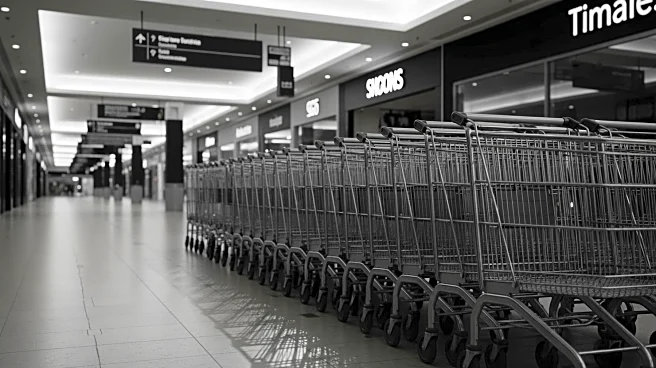What's Happening?
The retail industry is experiencing substantial job cuts, with October seeing 2,431 layoffs, a slight improvement from September's 2,577, according to Challenger, Gray & Christmas. Despite this minor improvement,
the sector remains one of the hardest hit, with 88,664 job cuts announced this year, marking a 145% increase from the previous year. The overall job cuts across all industries in October reached 153,074, a 175% increase from the same month in 2024. This surge in layoffs is attributed to AI adoption, reduced consumer and corporate spending, and rising costs, prompting companies to tighten budgets and freeze hiring. Major retail players like Target, Amazon, Puma, and Carter's have announced significant layoffs, affecting thousands of corporate roles. However, some retailers, including Dick's Sporting Goods, Amazon, and Michael's, are still hiring for the holiday season.
Why It's Important?
The significant job cuts in the retail industry highlight the ongoing economic challenges faced by the sector. The increase in layoffs reflects broader trends such as the adoption of AI, which is reshaping workforce needs, and the impact of economic pressures on consumer spending. These developments could lead to a shift in retail strategies, with companies focusing on efficiency and cost reduction. The layoffs also underscore the vulnerability of retail employees, particularly as the holiday season approaches, traditionally a peak hiring period. The broader economic implications include potential decreases in consumer spending and confidence, which could affect other sectors reliant on retail performance.
What's Next?
As the retail industry navigates these challenges, companies may continue to streamline operations and explore technological solutions to enhance efficiency. The focus on hiring for the holiday season suggests a temporary reprieve for some workers, but the long-term outlook remains uncertain. Retailers may need to adapt to changing consumer behaviors and economic conditions, potentially leading to further restructuring and innovation in business models. Stakeholders, including policymakers and industry leaders, may need to address the implications of AI adoption and economic pressures on employment and consumer markets.
Beyond the Headlines
The rise in AI adoption within the retail industry raises ethical and cultural questions about the future of work and the role of technology in shaping employment landscapes. As companies prioritize efficiency, the balance between technological advancement and workforce stability becomes crucial. Additionally, the economic pressures driving layoffs may prompt discussions on sustainable business practices and the need for resilience in the face of economic fluctuations. The cultural impact of these changes may influence consumer perceptions and brand reputations, as companies navigate the complexities of modern retail environments.










